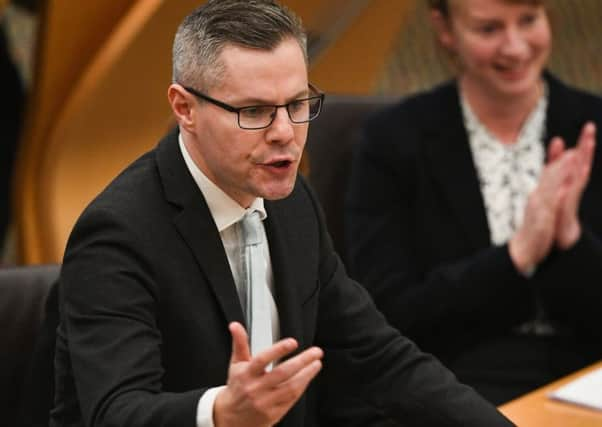Ian Swanson: Backroom bartering could rewrite historic budget


There was no return to a 50p top tax rate, as advocated by Labour, but for the first time the Finance Secretary used the powers of devolution to set tax rates for Scotland which are different from those south of the Border.
He stuck to the letter of the SNP’s promise of no increase in the basic rate by leaving it at 20p in the pound, but introduced a new 19p starter rate for lower earners and an intermediate 21p rate for those earning over £24,000, while increasing the higher rate from 40p to 41p and the top rate from 45p to 46p.
Advertisement
Hide AdAdvertisement
Hide AdMr Mackay explained his decision not to be more radical by saying financial modelling suggested a bigger tax increase for the higher paid could have resulted in a drop in revenue – because those due to be hit would choose instead to rearrange their affairs to minimise tax or, more dramatically, leave the country. He told MSPs: “I have set income tax policy at levels which the analysis says will generate additional revenue.”
Mr Mackay was also able to boast that the tax changes mean that anyone in Scotland earning under £26,000 – and that’s 55 per cent of all taxpayers – will now pay less tax than if they lived elsewhere in the UK. That helps undermine the Tories’ favourite jibe that the SNP has made Scotland the “highest taxed part of the UK”, though the Conservatives have responded by amending their claim to apply to “skilled workers”.
The SNP has proposed an income tax rise before – back in 1999, at the first Scottish Parliament elections, when its “Penny for Scotland” campaign failed to win over the voters.
At that time, the parliament only had power to vary the basic rate of income tax up or down by 3p. And the SNP’s proposal was to forego a tax cut announced by the UK Government.
Advertisement
Hide AdAdvertisement
Hide AdBut in this age of austerity, some politicians believe there is now a mood for fairer taxes and for once those polls saying voters are ready to pay more to help fund better public services might actually translate into reality at the ballot box.
That won’t need to be tested for a few years. The next Holyrood election is not until 2021.
However, Mr Mackay’s 1p tax rise could be seen as a precedent for future government action, the herald of other tax rises to come in the years ahead.
The Scottish Government’s budget announcement on Thursday was not the end of the process. The spending plans have yet to be approved by parliament, and for that to happen, the minority SNP administration needs the support or acquiescence of at least one other party – almost certainly in this case the Greens.
Advertisement
Hide AdAdvertisement
Hide AdThey would have liked Mr Mackay to go further with tax rises, but in the negotiations which will now take place before a final budget vote in February, the signs are one focus will be trying to improve the funding settlement for local government.
Last year the Greens did secure extra cash for councils, which among other things meant plans to cut library opening hours in Edinburgh were put on hold. There would be a widespread welcome for a repeat of that this year.
But there is no guarantee what will emerge from the behind-the-scenes bartering. Mr Mackay may well find making history is not always straighforward.